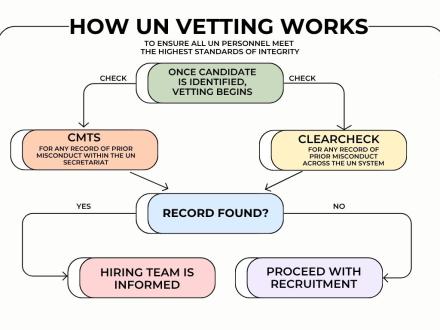
Vetting: Ensuring Integrity in United Nations Recruitment
The United Nations is committed to hiring individuals who uphold the highest standards of integrity, competence, and professionalism. The United Nations maintains a rigorous vetting process, aimed at ensuring that personnel recruited into the United Nations system respect the values and conduct expected across the organization.
How does vetting work?
The United Nations Secretariat records allegations of misconduct against its personnel. These records are maintained in the confidential Case Management Tracking System (CMTS). The Conduct and Discipline Service (CDS), in collaboration with various United Nations offices screens candidates for recruitment against records of prior misconduct to ensure that those who have engaged in misconduct while serving at the organization are not rehired. All categories of personnel are vetted, including international and national civilian personnel, United Nations Volunteers, individual contractors and consultants, members of formed police units, individual military and police officers, military contingent members and other government-provided personnel, such as justice and corrections officers.
What if someone has a record of misconduct?
The hiring team is notified if records show that an individual has been subject to disciplinary action or, in the case of uniformed personnel, if they have been repatriated on disciplinary grounds and barred from future deployment or hiring due to misconduct.
What about misconduct outside the United Nations Secretariat?
ClearCheck, a secure online platform, enables United Nations entities to share system-wide information on individuals with records of serious misconduct that resulted in, or could have resulted in, the termination of their working relationship with a United Nations System organization.
ClearCheck also includes relevant records from the United Nations Secretariat entities, enabling other entities within the United Nations System organization to screen candidates using this data.
See the latest Factsheet on ClearCheck below:
How do Member States support this process?
Troop- and police-contributing countries must certify that no individual being deployed or rotated has committed, or been alleged to have committed, violations of international human rights law or international humanitarian law, or been repatriated on disciplinary grounds and barred from United Nations operations.
Summary of the process followed for UN vetting

